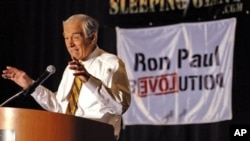In U.S. presidential politics, it has been a week of turmoil for Republicans hoping to challenge President Barack Obama in next year’s election. Two prominent Republican contenders, former Arkansas governor Mike Huckabee and New York businessman Donald Trump, have decided against a run for president in recent days, leaving some major questions about who will run for the party nomination in 2012.
Donald Trump got a lot of attention before he decided to pull out of the race on Monday. But the biggest impact on the 2012 Republican field so far is Mike Huckabee’s decision not to seek the nomination despite the fact that he was at or near the top of most public opinion polls.
Huckabee explained his decision on Fox News Sunday. “But I just somehow believed deep within me that it was not the right time and it was not to be, and whether it was a lack of detailed preparation, it is not going to happen this time," he said.
With Huckabee and Trump now out of the race, some Republicans are turning their attention to former Massachusetts governor Mitt Romney. He has not formally declared, but is raising large sums of money and is at the top of most public-opinion polls of likely Republican contenders.
Romney, though, is facing stiff criticism from conservatives for a health-care reform plan in Massachusetts he passed as governor that became the model for President Obama’s national health care plan approved by Congress last year.
Conservatives wanted Romney to disown the Massachusetts plan, something Romney said he would not do. Instead Romney has criticized the Obama plan as too sweeping. “I believe it is an economic nightmare. It does not lower health care costs, overall, in our system," he said.
Romney is not the only Republican contender with challenges to overcome. Former U.S. House speaker Newt Gingrich has officially entered the race, but continues to face questions about his two divorces and a history of adultery, an issue of concern to social conservatives, a key voting bloc within the Republican Party.
Gingrich spoke on NBC’s Meet the Press. “I have made mistakes in my life. I have had to go to God for forgiveness and to seek reconciliation and I would ask them to look at who I am today," he said.
Texas Congressman Ron Paul has joined the race and former Minnesota governor Tim Pawlenty and former Pennsylvania Senator Rick Santorum have also taken steps toward a White House bid.
But some recent surveys suggest Republicans are dissatisfied with the developing field of presidential candidates and would like to see other choices, bolstering the notion that this is the most wide-open Republican field in decades.
Peter Brown is with the Quinnipiac University Polling Institute in Connecticut. “One thing is pretty clear. Republican voters are looking for someone who can beat Barack Obama and that is a big deal to them and I think that will, to a large degree, drive the race," he said.
Indiana Governor Mitch Daniels says he will decide soon on whether to make a bid, as will Minnesota Congresswoman Michele Bachmann, a favorite among social conservatives and supporters of the Tea Party movement pushing for smaller government.
But analysts say it is never easy running against an incumbent president, especially one like Barack Obama who is a proven fundraiser and campaigner.
Stephen Wayne is a professor of government at Georgetown University in Washington. “So running against an incumbent with a recovering economy and an incumbent who can raise a lot of money and have no opposition [from within his own party], that is a big Herculean feat and none of the people who are serious contenders want to do it now if they could wait four years," he said.
Most experts see Mr. Obama in a favorable position for re-election, but far from a sure thing. They say the president’s re-election likely hinges on continued economic and job growth and that an unexpected downturn could quickly change the political dynamic for 2012.
Some Republicans, meanwhile, hope to lure other contenders into the race, including former Florida governor Jeb Bush and New Jersey Governor Chris Christie. But both of them have said no to a presidential run.
One prominent Republican who has given no hint of her intentions is former Alaska governor Sarah Palin, who was the party’s vice presidential nominee in the 2008 campaign.





